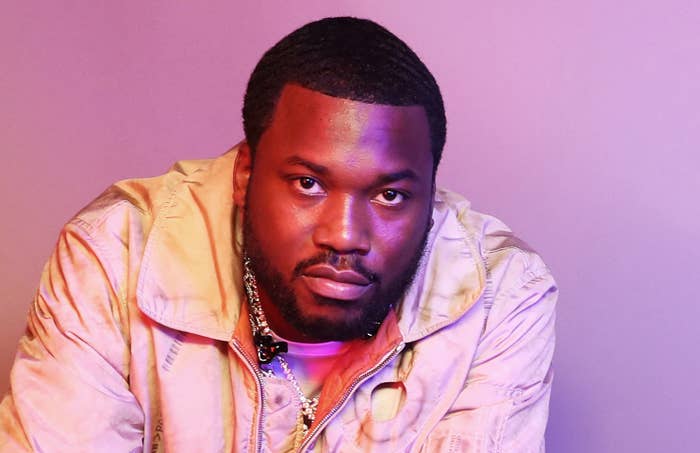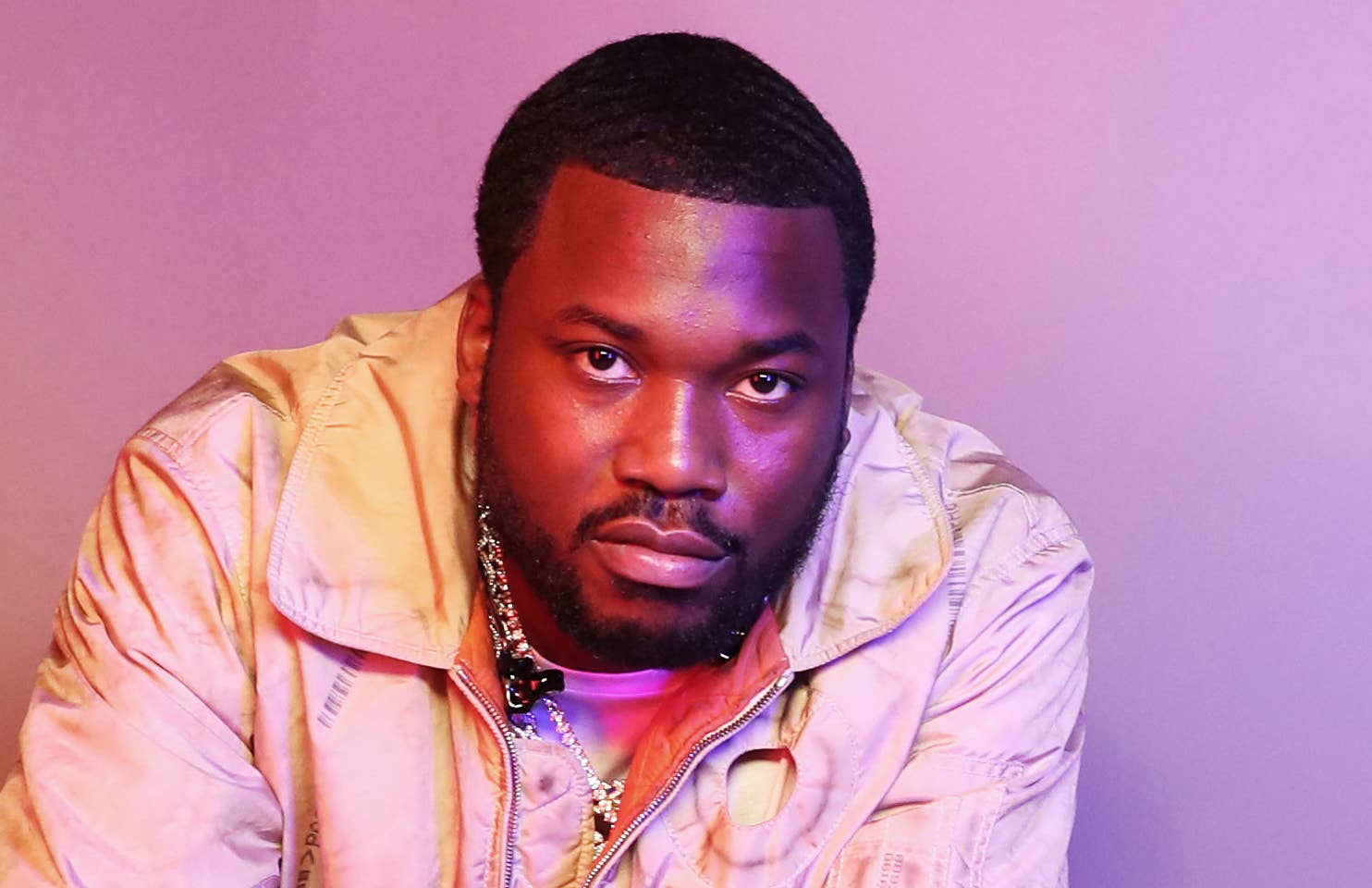
Amazon’s original documentary series Free Meek is more than the story of Meek Mill’s rise, fall, and re-emergence. The emcee born Robert Rihmeek Williams is certainly the focus, but the five-episode series does an excellent job of using his story as just one example of what the criminal justice system routinely does to people of color. At the film’s core is Meek’s 10-year battle with a crooked judge, a crooked cop, and an (at best) ambivalent court system. Williams was stripped of his inalienable rights as a prominent celebrity with plenty of money at his disposal.
The documentary asks a heartbreaking question: If Meek, Black and powerful, is so easily swallowed by our criminal justice system, what happens to the young Black man unable to access the resources Meek has at his disposal? If this can happen to someone like Meek, is anyone safe?
The film paints a precise and intimate portrait of Meek’s life, featuring interviews with figures like his mother, his sister, Van Jones, his extended family members, JAY-Z, and many others. It paints an empathetic web, although one scan at Meek’s story would turn even the most hardened cynics into staunch advocates for reform.
After returning home for the last time, allowed bail and a re-trial with a different judge, some expected Meek to make party songs, bask in his newfound freedom, and stack some cash (his legal fees must have been astounding). But instead, he formed the Reform Alliance, with the goal of getting 1,000,000 wrongfully convicted people out of jail or off probation through changes in antiquated and cruel laws. Meek has used this opportunity to become an advocate for justice, using his voice to prop up those more marginalized for him, when no one would have blamed him for returning home and getting back to a thriving career.
Above all, Free Meek is about community, and the power communities have when they rally around causes that are right and just. Meek Mill represents the best of us, and the worst of the system. He’s our bravest soldier, and our weakest link. He’s proof that money and fame can only be an escape if you look and behave a certain way. Meek Mill is all of us, and now he’s leading the fight.
These are our five biggest takeaways from Meek Mill's docuseries, Free Meek.
19 Charges, 19 Miscarriages of Justice
On January 24, 2007, a 19-year-old Meek Mill was arrested. He was charged with 19 separate crimes, all of which stemmed from leaving his home with a weapon. The rapper admits to making a mistake exiting his home with a gun, but the devastating results from that mistake don’t align with the crime. In the neighborhood Meek grew up in (and as a popular rapper in his area), weapons were often necessary for trips (even quick runs to the corner store). When Meek exited his home and headed down the steps, seven heavily armed police officers emerged from around the corner. Meek reached for his waistband to remove his weapon, and placed it on the ground. The cops attacked him, threw him against the hood of a car, and eventually used his head as a battering ram to open the home he was staying in.
Despite this, the arresting officer Reggie Graham alleged that Meek pointed his weapon at him. The officer also claimed that Meek had crack cocaine with an intent to distribute, which would also be proved highly dubious after years of trials and probation hearings.
At one point, Meek asks the camera, “Who made these things up?” It’s a fair question. Not many people point a weapon at an officer and live to face the consequences. Black people are consistently killed in this country without even carrying a weapon. “I know you don’t believe I pointed no gun at these cops,” he says. “You know I’d be dead or they’d shoot me or shoot at me.” His uncle concurs: “They claim Meek came out of the house and automatically drew a weapon on them. That’s false. If they claim he pointed a gun, I’m gonna be honest with you, he shoulda been dead.”
Equally puzzling was the intent to distribute charge. It’s essentially Meek’s word against the officer’s, and Mill says: “I was never known for selling crack and they never had any evidence of me selling crack.” A simple piece of evidence would have gone a long way in casting doubt on Meek’s claim, but the incompetence of the police force and the courthouse judge was staggering. Aside from falsifying claims that secured Graham his warrant to search Meek’s home, no property receipt for crack cocaine exists and no evidence was ever submitted at the trial.
Meek’s Battle Rap Roots
Footage from the documentary shows Meek battling from the age of 13. As a shy, introverted boy still bearing the scars of a father shot and killed at a young age, Meek’s entire family was surprised that he had skills as a lyricist.
His aunt Beverly recalls a hilarious mix-up that resulted in her discovering Mill’s skill. “My niece came in and said, ‘Rihmeek down there spittin’,” she remembers. “I said, ‘I know he ain’t down there spittin’ on nobody!’ That’s the first thing I’m thinking, you know? So I go down there and he’s battling back and forth with somebody.”
Meek’s attraction to the rap format came because of the pace: “Battle rap, that’s where I got my courage at. You’ve got three minutes to get off your best lyrics and impress the crowd.”
The first time he battled was in school. Up against a 16-year-old with a strong vocabulary, he says, “I watched my whole neighborhood turn on me in a second. When I walked off I was crying. It was a sad day for me but it was one of the best days of my life because from here on out, I’m taking rap serious. Y’all gonna remember. You’re gonna be playing my music one day.”
Meek came to see rap as a way to be protected from the cruelty of the Philly streets. Meek was shielded by his older male cousins and uncles. “He never sold no crack,” one of them says. “If you got a nephew, someone that play ball, you gonna make sure he do the right thing. We kept Meek in the studio.”
The Effects of an Absent Father
The pain of growing up without a father is still with Meek, and it added to the desperation of his jail sentence. With a little boy at home, Meek saw his son being faced with the same situation that’s scarred him to this day.
His father was named Robert Parker and he robbed drug dealers. His rationale was simple: They can’t snitch. It was a death sentence of a career, but it was the only way Parker knew how to feed his family. “If it worked for helping me out with my kids, it worked for me,” says Meek’s mother, Kathy Williams.
Meek was more conflicted: “I don’t believe in that. Nobody should take food out of nobody else’s mouth because they got kids to feed, too. I don’t knock him for doing it, though, because that’s how I was fed, that’s how I ate good at night.”
Robert taught Meek how to ride a bike and how to box as a very young boy. These are memories Meek holds onto tightly, but the image of his father is fading. “The memories are so old, you don’t know if it’s a dream or a memory at this point,” he says. “The main thing I remember is at his funeral, my aunt told me, ‘Tell your dad goodbye, you’re never gonna see him again.’ That stuck with me all the way up to today. Life still goes on. Nothing stops when somebody dies. Things keep going.”
Charlie Mack’s close relationship with Meek
You may recognize the name Charlie Mack. He’s a Philadelphia legend and “Charlie Mack (First Out of the Limo)” by the Fresh Prince and DJ Jazzy Jeff is a classic. He served as Will Smith’s bodyguard, and also appeared in the introductory sequence for The Fresh Prince of Bel Air. When Meek was coming up, Charlie Mack became his manager.
Charlie Mack had the ability to shape careers. In the documentary, photos with Big, Em, Kanye, Oprah and Obama litter the screen. Meek’s Flamerz 2 dropped while he was in prison. Mack organized the release. “This is when the whole city started listening to my music,” Meek says. “I had a 22,000 dollar check from iTunes. I’m ready to get signed.”
Within months, he caught a break and got discovered by Rick Ross. The relationships started in July 2010 when Ross came to Philly. Mack was instrumental in orchestrating the collaboration. Meek had his local followers retweet a plea to get Ross on his track, the regional hit, “Rosé Red.” Meek’s determination showed Ross the power of the internet, how one prominent voice can galvanize an entire community and spread the word. “He was calling me into Miami a few months later,” Meek explains.
Meek eventually signed to Maybach Music. Soon after that, he signed with Roc Nation to manage his career. He released his first major LP, Dreams and Nightmares, in 2012. His star was clearly growing and the tracklist scanned like a studded affair, featuring guests like Drake, John Legend, and Mary J. Blige.
Addiction
In 2016, Meek’s glow was bright. He was dating Nicki Minaj, one of the most famous rappers alive at that point. The documentary includes charming footage of Meek at his birthday, being gifted a watch from Nicki. He grins at the extravagant gift, as Nicki proclaims, “I only have a thing for one Philly n***a!”
But probation problems continued to plague Meek. In 2016, he had a probation hearing for moving a music video from one outdoor location to another in Philadelphia. Judge Genece Brinkley found him in violation of parole, and when the hearing was finished, she called Nicki and Meek into her chambers. The judge asked for Meek to record a remix of Boyz II Men’s 1994 hit “On Bended Knee,” and include a shoutout to her on the track. Meek declined, eventually speculating that this helped land him back in jail.
Meek had trouble dealing with the unhinged antics of a judge who was very clearly out to get him and a court system intent on swallowing the career he aspired to hold. He grew addicted to Percocet after getting wisdom teeth out, taking “Perc 30s and 15s, 10 a day,” he says. His reliance on the drugs stemmed from his addiction to feeling numb. In a world of pain and shocking disdain towards his life, Meek felt the need to drown it all out. Things spiraled further south for him from there.
Meek started tweeting about rumors and allegations he heard that Drake didn’t write his rhymes. Drake came for Meek’s career and his world was caving around him on all sides. He and Nicki broke up as well, with Nicki tweeting about her new found eligibility as a bachelorette. This was Meek’s lowest point, but luckily his probation officer insisted on a rehabilitation program and he hasn’t taken Percocet since.


